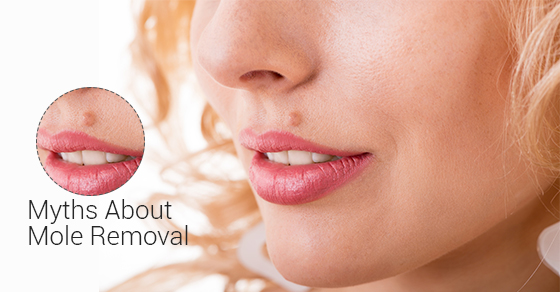Being in tune with our bodies is critically important. There are often signs when we aren’t eating right, aren’t exercising enough, or have an illness that needs to be addressed. The skin is one of the areas that should get frequent attention from everybody. The skin is actually our largest organ, and it is very susceptible to cancer. This is largely due to sun exposure, so the areas most frequently affected include the face, arms, and ears, but people who tan frequently will see greater risk on other areas as well. The alarm bell of the skin is the mole. This random blotch of pigment is seen in many ways. In the right location, it’s a “beauty mark” that adds character. In other areas, and with larger moles, it’s an unsightly blemish. Whether you love your moles or hate them, you need to be watching them. People who share the latter attitude about their moles often seek out mole removal techniques to rid themselves of moles. But before this process can begin, moles should be checked for their potentially cancerous condition. This goes for people who aren’t bothered by their moles. Early detection is critical; even melanoma is highly treatable if detected in its beginning stages, and the advancements in cancer treatment make your odds better every day. Make sure you are checking your moles on at least a monthly basis. As a memory aid, check yourself each month on the date of your birthday and spend part of your morning routine checking for skin and other cancers. The process of monitoring moles for skin cancer risks is as simple as A, B, C, D, E. A: Asymmetry Think back to elementary school geometry and recall symmetry. That’s a state of balance between two halves of a shape. Circles and squares are symmetrical; footprints are not. Asymmetrical moles indicate that there is some risk of cancer. If you cannot draw a line across a mole and get two identical halves, you should have the mole checked by a doctor. B: Border Moles should be very distinctively separate from the skin around them. That is, it should be easy to tell where the mole ends and the plain skin begins. Many healthy moles actually have raised edges that can be clearly seen and felt. Potentially cancerous moles have blurry, random borders that aren’t as clearly defined. C: Color Most moles are some shade of brown, and the coloration is consistent across the entire surface. Moles that indicate melanoma could be blue, white, or even red. Most shades of brown or even black are normal, but you should also bear in mind that a change in a mole’s appearance, even if the new appearance seems normal, is also a warning sign. D: Diameter Most moles are fairly small, roughly 1/4″ in diameter. Moles that indicate melanoma are typically larger, but bear in mind that they may start under that 1/4″ size and gradually become larger. Since this can be a lot to keep track of, it may be wise to photograph a mole and check it against your photo monthly to see if it is growing. E: Evolving Speaking of changes, any change in a mole is a warning sign. Healthy moles should remain fairly consistent in their appearance. If you have a mole that changes color, shape, or size, or that begins to hurt or itch, you should have it checked by a doctor. As with any health condition, a deviation from the status quo is always noteworthy. Those five letters cover the most significant red flags to watch out for. If we were to add a few more letters, we could say F, G, and H: Find a doctor and Get Help. Don’t live your life in fear of skin cancer, but remain alert to the possibility and take the steps necessary to intercept it before it gets too far. Preventing Moles from Forming Diagnosing moles is important, but it?s even more important to take appropriate measures to keep them from forming in the first place. You need to be aware of the different risk factors that contribute. Excessive exposure to harmful UV rays is one of the most common issues. It?s especially common among people that ran frequently without using a tanning peptide that reduces the time they need to tan for maximum results.








